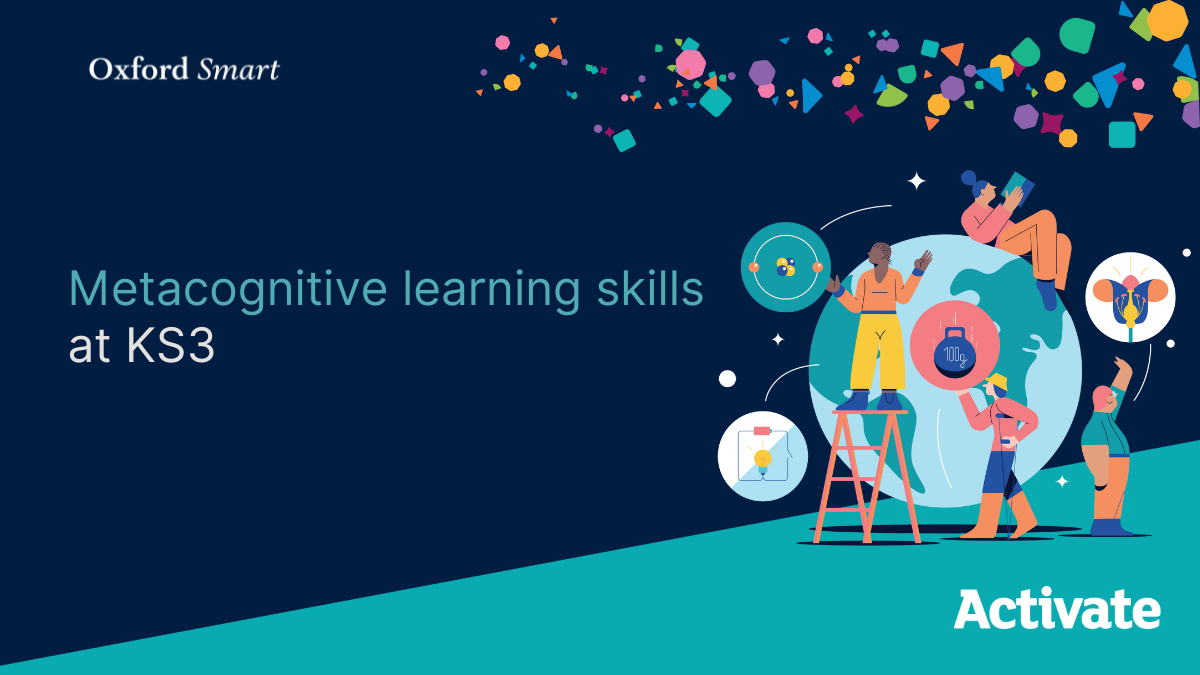Metacognition is commonly thought of as ‘learning about learning’. Whilst this is an oversimplification of what metacognition truly is, it is a helpful point to start from when looking at building a curriculum which enhances students’ metacognitive learning skills. There are two main parts to metacognition, metacognitive knowledge and metacognitive regulation. Metacognition is one of the six pillars that underpins the Oxford Smart Curriculum Service, and the curriculum for KS3 science has been designed to help both students and teachers in developing each of these aspects of metacognition. This blog post shows how metacognitive learning skills are developed in Oxford Smart Activate.
What do we mean by metacognitive knowledge and regulation?
Metacognitive knowledge is where students have knowledge of the types of tasks they will face, thorough knowledge of the strategies that they can call upon as well as knowledge of themselves as a learner. Metacognitive regulation addresses a students’ ability to plan, monitor and evaluate their own learning process. Whilst some aspects of metacognition translate across subjects, the majority needs to be addressed within subject specific contexts. Therefore teaching metacognitive strategies alongside science content is absolutely key.
Just in the same way that subject content would be carefully sequenced so that skills and knowledge build over time, metacognition has been embedded into the curriculum in Oxford Smart Activate in a way that allows students to build their metacognitive learning skills as they progress. Each year students are able to explore aspects of metacognitive regulation and metacognitive knowledge through age and phase appropriate tasks.
What does metacognitive learning look like at KS3?
Year 7
The main focus for year 7 is introducing them to what it means to be a secondary school scientist. Initially students explore the new challenges that they will face in terms of ‘working like a scientist’. This includes working that bit more independently and what it means to be able to read like a scientist. Students are also introduced to the Plan Monitor and Evaluate cycle as a way that an expert learner approaches new tasks. Both are delivered with the challenges of the transition to KS3 in mind. Through careful explanation and examples students can gain confidence through understanding what it means to be a successful learner in science.
Year 8
In year 8 students start to build their metacognitive knowledge even further taking them on a journey to becoming an expert learner. Students start to explore what wide range of strategies they have available to them to be successful in science. For example strategies like the EVERY method for calculations is introduced as well as summary resources like graphic organisers. Going beyond the simple introduction of a strategy and to help build metacognitive skills, students are supported in becoming an expert learner through understanding the importance of knowing what strategies they have, how they should use them and why they are useful.
Year 9
Finally, the key focus for year 9 students is equipping them to successfully navigate the transition KS4. In addition to evaluating effective revision practises, students explore the importance of reflection and how evaluating their own strengths and weaknesses is vital for success.
How does Oxford Smart Activate support teachers embed metacognitive learning skills?
Alongside all of the student resources, the Teacher Handbook supports staff in gaining a deeper understanding of what metacognition is. For each of the KS3 foci, there are clear examples of what they look like in practice as well as strategies for delivering the metacognitive approaches effectively. With modelling being a crucial component of teaching metacognitively, the Teacher Handbook also explores effective approaches for modelling so that teachers feel more confident in embedding metacognitive skills into their classroom.
To really support students in becoming more self-regulated, metacognitive strategies need to be woven into everything we do. The resources included in Oxford Smart Activate act as a scaffold for supporting this, providing a structured approach to developing metacognition with students alongside a challenging science curriculum.
Lauren is a Physics teacher and Assistant Director of Blackpool Research School. She tweets at @LST_Physics and blogs at http://www.teachingandlearningdiaries.com/
Listen to Lauren Stephenson discuss metacognition and bridging the gap between research and the classroom in the third episode of series 2 of Word Up with Helen Prince podcast here.
For the first time, curriculum, resources, assessments, next steps and CPD work seamlessly together. Click to find out more about Oxford Smart Activate and sign up to access the digital taster.
You may also be interested in:



